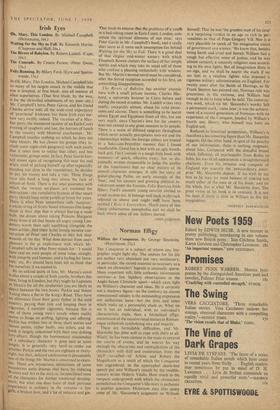Norman Effigy
William the Conqueror. By George Slocombe. (Hutchinson, 25s.) THE Conqueror is a subject of whom any bio- grapher might tight shy. The sources for his life are neither very abundant nor very satisfactory; in particular, the record material so necessary as a check on chroniclers' legends is unusually sparse. More important still, little authentic information survives—a few lapidary observations in the Anglo-Saxon Chronicle apart—which casts light on William's character and ideas. He is certainly not a shadowy figure—on the contrary an almost monumental solidity is the outstanding impression our authorities leave—but .the tints and tones which make up a personality elude us. What we see is less an individual, with an individual's characteristic traits, than a formalised effigy, reminiscent of the massive royal statues in Roman- esque cathedrals symbolising awe and majesty.
These are formidable difficulties. and Mr. Slocombe has done well to cope with them at all. Wisely, he has been content in the main to unravel the course of events, and he weaves his way through the obscurities and contradictions of the chroniclers with skill and moderation. from the 'idyll'—so-called—of Arlette and Robert the Magnificent as a result of which the Conqueror was engendered, to the apocryphal death-bed speech put into William's mouth by the twelfth- century writer Orderic Vitalis. How much in the rampant undergrowth with which the chroniclers embellished the Conqueror's life-story is authentic is another question. Historians May also query some of Mr. Slocombe's judgments on William himself. That he was 'the greatest man of his time' is a surprising verdict in an age so rich in per- sonalities as that of Pope Gregory VII. NOr is it very plausible to speak of 'his imaginative vision of government as a science.' We know that, besides being harsh and cruel and feared. William had a rough but effective sense of justice, and he was almost certainly a sincerely religious man accord- ing to his own lights. But of imagination there is no sign, and we shall be nearer the mark if we see him as a resolute lighter who imposed a rigorous military administration on England. For twenty years after the Battle of Hastings, as Sir Frank Stenton has pointed out, Norman rule was precarious in the extreme, and William had enough to do to keep what he held. The construc- tive work, which (in Mr. Slocombe's words) 'left a permanent mark,' came later; it was the achieve- ment of a second generation of Normans with no experience of the Conquest, headed by William's fourth son, Henry, who himself was born on English soil.
Reduced to historical proportions, William's is therefore a less towering figure than Mr. Slocombe suggests. On the other hand, in spite of the paucity of our information, there is nothing enigmatic about him. Compared with the dreadful brood which follov, ed. all psychopaths from Rufus to John, his was to all appearances a straightforward character.- Even his invasion and conquest of England was scarcely the :extraordinary enter- prise' Mr. Slocombe depicts. If we Wish to see him as he was. we must beware of making too much either of the man or of his deeds; and on the whole this is what Mr. Slocombe does. The great virtue of his book is its restraint. It is not his fault. if there is little in William to fire the imagination. •






































 Previous page
Previous page